How can you prevent millions of euros for better education from evaporating again? We asked four experts by experience. “The current ad hoc policy is pitiful.”
(Photo for illustration: Dalia Madi)
By Altan Erdogan and Henk Strikkers
These are our experts:
- Supervisor Pim Breebaart is ex-manager, ex-supervisor and ex-chairman of the Association of Supervisors for Universities of Applied Sciences.
- Lecturer Jeroen Janssen is associate professor of Education and Pedagogy at Utrecht University.
- Senior lecturer Ellen Klatter is lector of Study Success at Rotterdam University of Applied Sciences.
- Student Alex Tess Rutten studies Cultural Analysis at the University of Amsterdam and is former chairperson of the National Student Union and ex-student council member at the University of Amsterdam.
It has been like this for everyone at universities and universities of applied sciences for more than a year: talks, discussions and presentations take place online. So, student Alex Tess Rutten, lector Ellen Klatter, supervisor Pim Breebaart, and Jeroen Janssen also meet on screen, via Zoom.
Based on the results of our journalist research, they debate about political promises, the basic grant millions, how to measure the quality of education, and the role of employee participation in higher education. We start by putting a statement about politics before them.
1. The Rutte-II cabinet should never have promised students better education in exchange for them surrendering their basic grant.
Ellen Klatter: “Intuitively, I find that a minister should promise this, but in practice universities and universities of applied sciences have a tremendous amount of authority. Therefore, government can’t guarantee very much. What I have noticed at many universities of applied sciences, is that they don’t try to find out what the bottleneck is. I would like the government to invest more in the investigative attitude of lecturers and managers and in powerful expert education leadership. Many directors manage by spreadsheet rather than content. Which vision are we developing? And how do we get there? It is fascinating how little knowledge there is on that.”
Pim Breebaart: “Whatever the minister says about the quality of education, she ultimately has very little to say about that. Boards in higher education are quite autonomous in how they provide education, something that has been fixed in the WHW [the Higher Education and Academic Research Act, which lays down the rules for the setup of universities and universities of applied sciences] since 1993. You need to be sceptical about a minister who promises better higher education.
That negotiation process in 2015 was very strange: the minister negotiated over the heads of the institutes directly with the students. Also, the Association for Universities and the Association for Universities of Applied Sciences, who also signed, have no power to overrule. The decision authority lies in the hands of the separate boards, but they weren’t included in the negotiations.
Ultimately, a team of lecturers and involved students from a study programme, have the greatest say in the quality of a programme. Certainly not the minister or Parliament.”
Jeroen Janssen: “I also agree with the statement, although there are some places where a lot of thought is put into what should happen with that money. But you can’t make such a promise on a national level. Moreover, in the first years it was a drop in the ocean. In the meantime, it has become a substantial amount, and you see that we can invest in employing personnel. I am curious to find out what this means for the quality of education in the long term. How do you show that the quality of education has improved? The initial reflex is to put it into spreadsheets, which makes me very sad.”
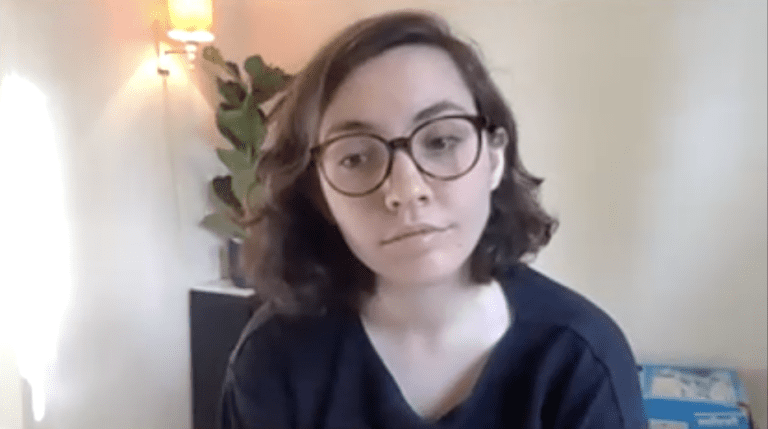

Alex Tess Rutten on Zoom: “Vulnerable students from lower socioeconomic groups suffer disproportionately more from the loan system.”
Alex Tess Rutten: “What I really object to is that minister Bussemaker, by making this promise, has linked two distinctly different things: the quality of education and the discussion about student financing. We still notice that. Last year we campaigned together with LSVb against the lending system, and then you are asked: “Are you against more money going towards the quality of education?” No, of course not. They are two separate things. They have been linked in a strange way, which means that you can no longer discuss each subject on its own. Politically, it was a clever move, but for a pure discussion you should separate them.”
Breebaart: “Not enough research is done into the effectiveness of all kinds of education policies. In the nineteen-nineties, for example, universities of applied sciences introduced study career guidance into their curricula. I don’t hear a lot of students saying: I learned a lot from that study career guidance. Yet, the methodology has remained. It is an example of how institutes can cling on to things, instead of carrying out a thorough investigation into whether something is effective or that it could be done differently.”
Klatter: “I feel that we should look for quality in what is called the primary process: in the classroom or the lecture hall. Set an objective, think about how you want to achieve it and afterwards check whether you managed to achieve it. It is possible during the lesson or a lecture. But if we want to determine this at a somewhat higher level, for example within an institute or within a faculty, this suddenly no longer happens.”
2. It was unfair to give students such a large role in the way the basic grant millions are spent.
Rutten: “Students are experts in the field, so you have to include them. That is why the student unions rallied for this. At the same time, students have a huge deficiency compared to the boards when it comes to knowledge and time. Unfortunately, since the introduction of the loan system, the quality of employee and student participation has deteriorated. I now give training to student councils and you see it getting less. It has become an exception that students want to take a year to do the job, and follow next to no subjects. Moreover, because of the loan system, students hardly want to spend more than a year on council membership.
When I was a member of the faculty council in my first year, I had no idea what was happening. Last year the National Youth Council carried out an investigation and it turned out that 86 per cent of the student board members in the Netherlands say that they can only do it because they are financially supported by their parents. This also makes the composition of the councils rather one-sided.
On top of that, there are the cuts in higher education. Does it have any effect if you set up a blended-learning project on the one hand, while on the other hand you have to create larger working groups because basic funding is deteriorating? And, as a student, can you see through such issues?”
Janssen: “I understand that Alex is saying that participation at a central level is complicated. We have organised study programme committees locally; these are very close to the programmes. Students were able to collaborate with us very well about where the money should go. That had to be done: it was their money.”
Klatter: “Our representative advisory council in Rotterdam is very involved. An initiative was launched under the heading “What to do with 26 million?”. That attracted a lot of students. What is difficult though, is the fact that students can often put their finger on and say what is not going well, but they can’t assess very well whether the education process is sound. Of course, they are not education experts.”
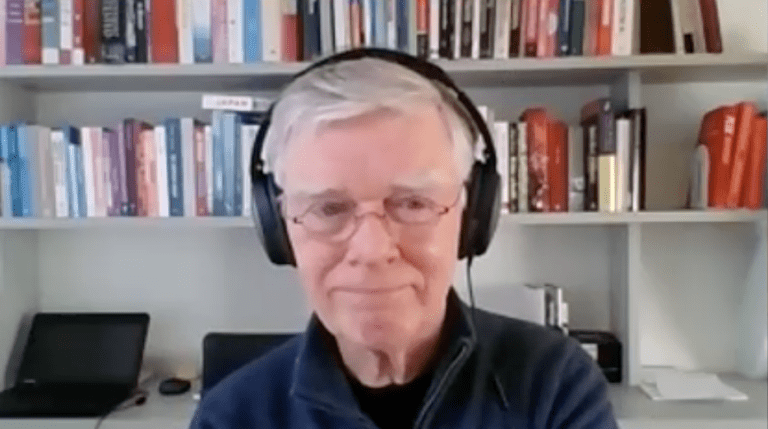

Pim Breebaart on Zoom: “Because no specific objective has been formulated for the basic grant, I guarantee that things will go wrong again.”
Breebaart: “At all 53 institutes that were visited by NVAO panels, students said that they are sufficiently involved in the plans. Through discussions in councils, but also for example, by having meetings at universities of applied sciences where everyone can participate in the discussion. In 2018, many managers said that they felt that this was the most difficult part of the national agreements, but in practice the NVAO panels have not noticed that students have been pushed aside.”
Rutten: “Well, my experience as a student in NVAO panels is that it is unbelievably tough to estimate in such a meeting how involved students really are. I am critical and not shy about speaking out, but I would also be positive about a plan that I had worked on together with the board if a panel came to visit. You also want to bring in that money for your institute. Students have a weird role. Having a pleasant discussion doesn’t necessarily mean that you have a strong representative body or that things went well.
Through my job as a trainer of the representative councils, I visit all kinds of universities and universities of applied sciences, from study programme committees to central councils. And I hear managers think much of the quality of their representative councils, while I know that they are not so great. Then it turns out that basic conditions on the right to be informed, requests for approval and terms not in order. You can have a nice talk then, but that’s all it is.”
3. Creating and assessing quality plans has led to a superfluous circus that provides no guarantee for better education.
Janssen: “It tends to quickly become a bureaucratic monster, is my experience. Then it’s about how many lecturers you have appointed or about professionalisation, and how many courses have been taken. You can hang all kinds of parameters on it. This often distracts from the primary process.
We still have a bellyache from the last time we had to make these types of agreements (the so-called performance agreements, ed.) We had to accurately specify down to decimals how much education we had provided and what it looked like, a nightmare. That has cost a great deal of time, energy and frustration. There is, at least at universities, a lot of resistance against these kinds of processes. I also don’t know if it ultimately yielded anything useful for the quality of education.”
Klatter: “I do think that it is a good thing to have a kind of quality mark for panels of experts. It forces you to write things down and think about them. But I can imagine what your experience was like, Jeroen. Our university of applied sciences had its first report with plans rejected. It continues to be… well, yes. It continues to be an awful lot of process language, and then the question is: why do we do things this way?
Take the question of appointing of extra lecturers. Of course, you want them, but what happens in the meantime to the lecturers who are already there? Are they going to be trained so that the quality of education really gets better, or are they complemented with all kinds of lateral entry colleagues who aren’t actually lecturers? Does this lead to the improvements that you want?”
Pim Breebaart and Alex Tess Rutten both have a place on the NVAO panels that have to check the quality agreements at the moment. Folia: How can you actually check whether the quality of education has improved?
Breebaart: “I recognise what Jeroen and Ellen say. There is undoubtedly bureaucracy mixed up in it, it is almost inevitable. Don’t forget that the minister, Parliament and the institutes also speak in process language. This makes it difficult for a visiting NVAO panel to check if the quality of education really has improved.
In addition: communication in 2018 was not as it should be. VSNU and the Association for Universities of Applied Sciences had had enough of the performance agreements, and publicly stated: That never again. It was understandable. This forced the minister to do something else and so the option of NVAO panels came about.
In my opinion, NVAO and its panels implemented the national agreements with as much integrity as possible. But I am the first to admit that it was not until the middle of 2019, when it appeared that many plans by universities of applied sciences were classified as ‘insufficient’, that NVAO sent a letter explaining more clearly what was expected of these universities. That should have happened sooner.”
Rutten: “I also had a problem with those documents full of process language. I mostly checked smaller universities of applied sciences, the ones with two thousand students or less. There is something wrong there: the University of Amsterdam, with 39 thousand students, has to jump through the same hoops as a university of applied sciences with 1.5 FTE policy advisers. That was painful to see. By the way, it wasn’t just the plans from the smaller universities of applied sciences that were rejected.
Some institutes receive money through the quality agreements, and at the same time they heard from the minister that they had to do with less money because of the Van Rijn committee report. What effect does this have on the discussion you have there as a panel? That caused a lot of discomfort: we do everything in our power, and in the end, we don’t get anything extra.”
4. All the basic grant money should have gone into appointing extra lecturers.
Klatter: “No. Because you first have to come up with a good solid analysis of your present education system. Tremendous strides can be made in this area. Curriculum improvement, and policies on exams could be much better. A lot can be done to improve the quality of the current teaching staff. Adding a whole group of new lecturers requires a lot of training capacity, while training is not even as it should be at the moment. Back to basics, I would say.”
Janssen: “If you ask me whether I want more lecturers, obviously I would say yes. Nevertheless, I don’t agree with the statement. Of course the shortage of money that universities have has led to overworked lecturers, but there is much more going on. Ellen is right: we really need to do something about the professionalisation of new and existing lecturers. There is a lot to be gained there, just like with the improvement of the curriculum.”
Breebaart: “My answer would also be a resolute no. Certainly at universities of applied sciences, sometimes sketchy knowledge levels, insufficient study skills and a lack of focus by students on their study programmes are a greater problem than the number of lecturers. Many students from lower-income families live at home, often feel the need to perform household duties and sometimes have two to three student jobs simultaneously. This makes social integration into the university of applied sciences increasingly difficult, and it obstructs their study progress. A lot of the quality of education is eliminated by the financial situation of this group of students. Such a shame. This is even worse during the COVID-19 pandemic.”
Rutten: “I would have liked to have said yes to this statement. Because I wonder to what extent all that money that goes to central policies at the larger universities and universities of applied sciences, yields effective results on the work floor. In recent years, education has been stripped to an increasing degree.
Indeed, it doesn’t help when you blindly give lecturers two additional hours. At the same time, the results of student papers, for example, show that halving the number of contact hours has not improved matters. You need real space in your head to be able to develop as a lecturer, and to be able to reflect. If I look at my own lecturers, they don’t have that; it is mere survival.”
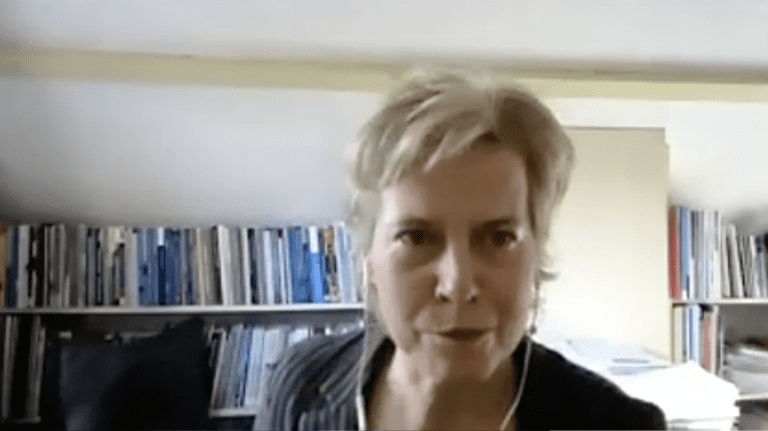

Ellen Klatter on Zoom: “Everyone is wrung out to work even more efficiently and even more effectively.”
Klatter: “The pressure of work is indeed very high. By way of experiment, we started a programme from scratch, where lecturers took the lead. They told their managers what was the best thing to do, and they were able to justify this. Ultimately, they worked more hours, for themselves and for the students, but they experienced less work pressure, and work satisfaction was higher.”
5. Abolishing the basic grant wouldn’t have been necessary if the growing numbers of students had been halted on time.
Rutten: “I don’t know if that is the case. We still have a fairly accessible education system, but it is increasingly coming under pressure. Investments in education create a minus when the effects of election programmes are calculated, while everyone knows that it yields a plus in the long term. That’s a bigger problem.”
Janssen: “Within our university, we are one of the few study programmes to remain reasonably constant. The growth of student numbers does indeed create pressure. We feel that accessibility for everyone is important, and if you agree with this statement, this is what comes under pressure. That should not be the direction to take. I do indeed feel that the government fails in all areas and levels to invest in education.”
Breebaart: “I don’t see much proof for the relation between there being a basic grant or not, and the growth of higher education. The growth in the number of students has much more to do with demographics and social developments. Many youths want to have higher education at all cost. This has very little to do with student financing.”
Klatter: “Our university of applied sciences had 35,000 students in 2015 and almost 40,000 in 2019. We need correspondingly more money. I also find it distressing that the Netherlands scores rather low when it comes to investments in higher education and research. Curiously: we consider the theme of ‘the Netherlands as a knowledge economy’ of paramount importance, but we don’t invest a lot in it. Everyone is wrung out to work even more efficiently and even more effectively. Grass doesn’t grow any faster just because you pull harder at it, but it does if you give it the proper nourishment. That applies to students, but also to lecturers and researchers.”
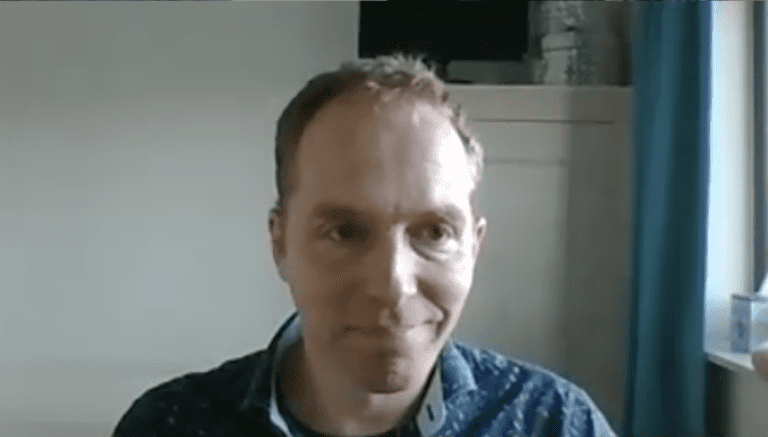

Jeroen Janssen on Zoom: “This kind of ad hoc politics is pitiful, and for people in education it is very demotivating.”
Janssen: “Even following educational politics on education a little, one is saddened by the quality, the games that are played, and the lack of continuity and vision. You see the same happening with the growing number of students. We are elaborating on all kinds of plans but there is a pretty good chance that we will have to soon stop doing so again. This kind of ad hoc politics is pitiful, and for people in education it is very demotivating.”
Breebaart: “Of course it is crazy. NVAO is almost finished with the assessment of the quality agreements of every institute and we know that after the elections it is most likely that a large majority in Parliament will be in favour of the re-introduction of the basic grant. But because no specific objective has been formulated for the basic grant, I guarantee that things will go wrong again; mark my words.”
Rutten: “You see that vulnerable students from lower socioeconomic groups suffer disproportionately more from the loan system. At universities of applied sciences, a large number of students work more than should be possible when you are a full-time student. More and more youths have a difficult start in life, also because of the housing market and the flexible labour market. Then add COVID-19 to that. Here lies a tremendous challenge in which education and politics can play an important role.”
With the co-operation of Yvonne van de Meent and Laura ter Steege.


How it might all go wrong again with the student grant millions
This is how your basic grant died
In search of millions, buried between promises and practices
How the hundreds of millions of euros from the basic student grant evaporated
Pre-investments: a recipe for failure
Folia / Het journalistieke medium van de Universiteit van Amsterdam


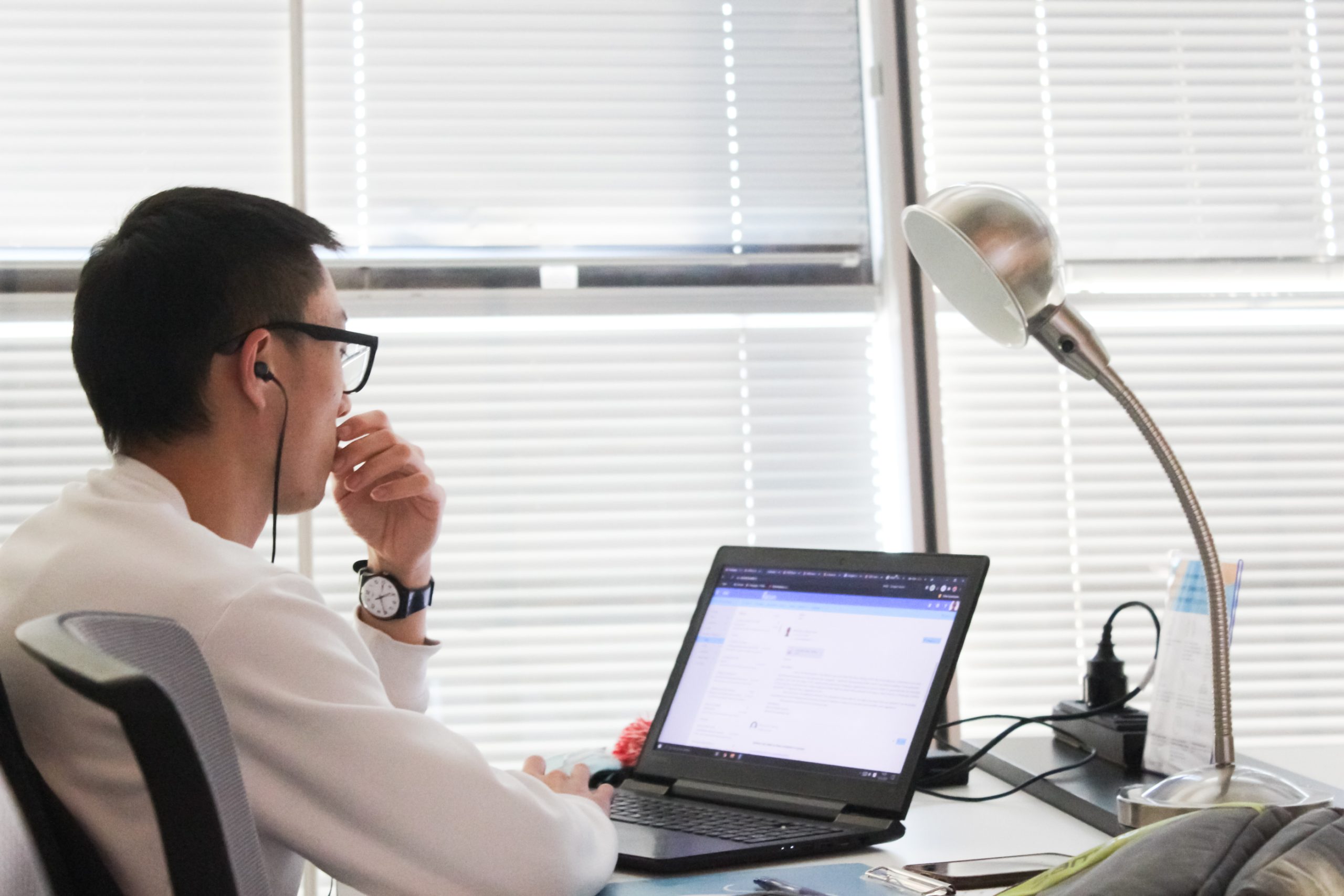
Comments are closed.